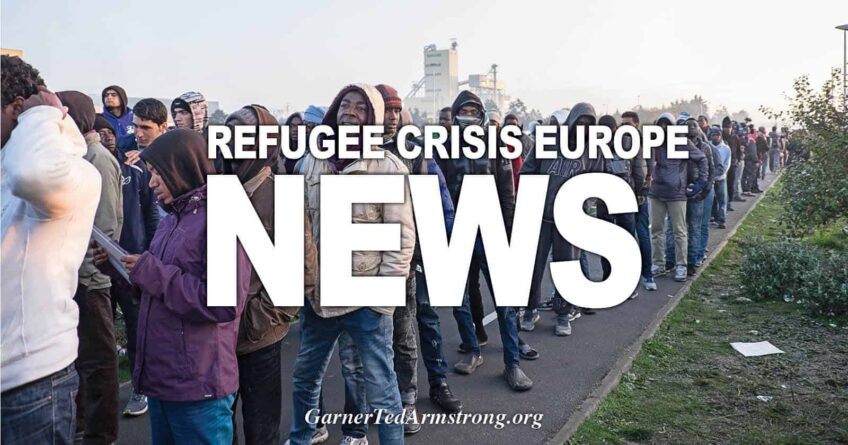LONDON – “The traditional system of Europe to screen and receive refugees was good enough before the refugee crisis but, with increased mobility, the system has collapsed,” warned UN High Commissioner for Refugees Filippo Grandi at the World Economic Forum in Davos.
“It has collapsed as a reception system and as a shared system. Europe has lost the sense of shared solidarity. Some states do, some states don’t,” he added.
While various European countries adopted new methods to deal with migrants and asylum seekers who continue to flock to the continent, the “migration crisis,” as it has become known in the Western media, remains pervasive.
A hard-fought agreement between France and the United Kingdom to prevent the formation of another refugee camp at Calais remains the exception. While such agreements can only be reactive, there are deeper issues that address root causes requiring greater effort from the European Union as a whole.
The United Kingdom agreed to pay nearly $55 million for extra security measures, part of a deal that effectively updates the 2003 Le Touquet agreement, which shifted British border control to the French side of the channel.
The money will go towards extra security in Calais and around the channel port, including fencing, CCTV and other detection technology, with the United Kingdom also agreeing to accelerate procedures for accepting legitimate migrants and asylum seekers — including unaccompanied minors — currently in limbo in France.
However broader questions remain on how the system would deal with failed asylum seekers, with many countries accused of allowing the free passage of illegal migrants and failed asylum seekers across their borders once they reach the continent.
Several European countries offer migrants and asylum seekers financial incentives to leave, including Germany, which has moved to pay migrants extra until February 28. Individuals will get about $1,200 and families approximately $3,700 to cover rent or resettlement costs in their home countries.
The United Kingdom, Sweden and Norway pursue similar policies. Figures from the International Organisation for Migration indicate that 98,403 people returned to their countries of origin in 2016. More than half — 54,006 — left from Germany. Around 39,000 (61%) received cash or benefits at a cost of $32.7 million.
A study titled “Out of Africa: The Organisation of Migrant Smuggling across the Mediterranean” by Cambridge University warned that European attempts to stem the tide of migration will fail unless they address root causes in the migrants’ countries of origin.
“Criminal justice responses require the adoption of coordinated tactics involving all countries along the route to target these localised clusters of offenders simultaneously,” said report author Paolo Campana.
“This is a market driven by exponential demand and it is that demand which should be targeted,” he added, calling for Europe to address the conflicts, instability and poverty that drive migration.
The study was released the same week that Europe’s border agency warned that the number of migrants and asylum seekers crossing the western Mediterranean to Europe is likely to increase in 2018, particularly via Spain. It lacks the refugee intake services that have been created in Italy and Greece, with many predicting disaster unless action is taken now.
“The bad news is in the western Mediterranean… Spain deserves more solidarity from the European Union,” said Fabrice Leggeri, the director of the European Border and Coast Guard Agency known as Frontex.
“Economic migrants don’t want to end up in a country [Libya] where there are clashes between armed groups… There are individual cases considering finding an alternative route,” he added.
Frontex said 22,900 people were detected as they reached Spain via Morocco or Algeria in 2017, up from 10,231 in 2016. That figure is expected to be higher in 2018.
The seemingly unending flow of economic migrants and asylum seekers into Europe has infiltrated European politics, with far-right parties normalising anti-immigration discourse in various election campaigns in 2017.
This is a trend that is expected to continue this year with far-right groups in Italy such as Forza Nuova and the Northern League relying on anti-immigration rhetoric to boost their chances in the March general election.
“We cannot [accept all asylum seekers] because we won’t all fit, so we have to make choices… if our ethnicity, if our white race, if our society, should continue to exist or if it should be wiped out,” said right-wing Northern League candidate for president of Lombardy province Attilio Fontana to local Radio Padania.
The Northern League, a right-wing nationalist party, is the largest political party in Veneto and Lombardy in northern Italy.
In Austria, where the far-right, anti-immigration Freedom Party is part of the coalition government and head of several ministries, Interior Minister Herbert Kickl faced criticism after he said that he wanted “basic services centres, suitable infrastructures that enables us to concentrate people in the asylum process in one place.”
His use of the term “concentrate” was viewed as provocative, given Austria’s history under Nazism, including the establishment of the Mauthausen-Gusen concentration camp where tens of thousands of people were killed during the Holocaust. The Freedom Party was established following the second world war by former Nazis.
Kickl’s comments came as Freedom Party leader Heinz-Christian Strache, who is Austria’s vice-chancellor, said migrants should be held in disused barracks and subjected to curfews to keep “order” in the county.
With Europe braced for increased immigration and hateful far-right anti-immigration discourse becoming increasingly mainstream, many are calling on the European Union to take decisive action to tackle root causes.
Several European countries offer migrants and asylum seekers financial incentives to leave, including Germany.
Mahmud el-Shafey is an Arab Weekly correspondent in London
This article was originally published in The Arab Weekly.
Source: http://middle-east-online.com/english/?id=86972
[Disclaimer]









